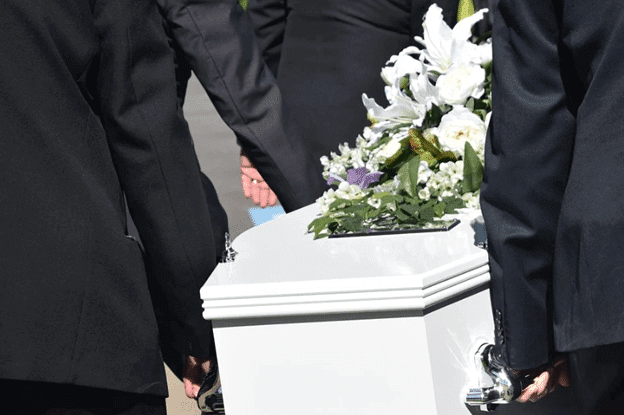
Whitney & Murphy Funeral Home is a trusted funeral home that offers funeral and cremation services in Phoenix, AZ, and surrounding areas. We are happy to be family-owned and operated since 1903, enabling us to care for each family as our own. We provide a comprehensive range of services and products, and our knowledgeable team can assist you in making the best decisions for your family. We have a state-of-the-art facility, and our decorated rooms are large enough to accommodate big and small gatherings. Call us today at (602) 840-5600.
Originating well over a century ago in 1903, the roots of Whitney & Murphy Funeral Home are firm and deep. Though names and locations have changed through the years, the family’s influence and legacy to provide compassionate and honest service for funerals and cremations in the greater Phoenix area is a commitment we are pleased to uphold.
Knowing that ethical and transparent business practices are the key to a strong business reputation, we work very hard to provide our community with the highest and best service. Client families come to us in a time of great distress and vulnerability. Our mission is to lift and help those suffering from deep anguish as they navigate the loss of someone they hold dear. The dedicated team of funeral and cremation experts at Whitney & Murphy is here to guide you through this journey and ease your burden.
Types of Services for Funeral Home and Cremations in Phoenix, AZ
End-of-life honoring services are held with respect to those who have died. However, if you think about it, they are actually arranged for the benefit of the living. Commemorative services will have a particular impact on the individuals who are most affected by the loss of this individual. There is a wide-ranging consensus that those grieving are deeply supported by the closure offered through a funeral or other reflective services for a departed loved one.
With that said, there are many different backgrounds and cultural traditions that may impact how you feel that honoring your deceased would be best. At Whitney & Murphy Funeral Home, we have supported people from every walk of life and faith background. We begin by determining with you what style of service will be best. Some standard service definitions may be helpful:
Traditional Funeral Services:
Often, the most formal style of service is the full traditional funeral service. This can include a family visitation or a wake before the funeral. The deceased traditionally lies in repose at the funeral setting, often shrouded or in a closed casket.
Graveside Committal Service:
This is often an intimate gathering, but invitations may be widespread. When held at the burial site, the graveside service may precede some style of memorial service at a later time.
Memorial Services:
A memorial is held without the deceased present at the service, making timelines a bit less rigid. Families who need more time for gathering or planning the services may benefit from a memorial-style service. Memorial services are also helpful if there are no plans for public viewing and if the body will be cremated immediately.
Cremation Services:
Cremation is a method to handle the final remains in a respectful and sanitary way. The cremation results leave a modest amount of ashen material that is returned to the family for the final disposition they have planned for their loved one.
The Funeral Process at Whitney & Murphy Funeral Home
The funeral process, as facilitated by Whitney & Murphy Funeral Home, is a compassionate journey designed to honor the deceased and support the bereaved. This comprehensive process involves thoughtful steps to ensure every detail is managed with professionalism and care. When a family reaches out, the funeral home team offers guidance, coordination, and emotional support to help navigate this challenging time.
Detailed Steps in the Funeral Process
1. Initial Contact and Transfer
Upon the family's initial contact, the funeral home arranges for the dignified transfer of the deceased from their place of passing to the facility. This often involves coordination with hospitals, nursing homes, or private residences, ensuring transportation complies with local regulations and maintains the utmost respect for the deceased.
2. Body Preparation
The body is carefully prepared at the facility according to the family's preferences. This step may include:
- Sanitization and Dressing: Washing and grooming to restore a natural and serene appearance.
- Embalming (Optional): is a preservation technique often chosen for extended viewings or when body transportation is required over long distances. Although it is not legally mandated in many cases, it can be beneficial depending on the circumstances.
- Personalized Details: Incorporating specific clothing, hairstyles, or other touches to reflect the individual's personality and wishes.
3. Family Consultation
A funeral director meets with the family to customize every aspect of the arrangements, which may include:
- Casket or Urn Selection: Families can choose from various materials and designs, considering factors like durability, aesthetics, and budget.
- Viewing or Visitation Preferences: Options range from intimate family-only gatherings to larger public ceremonies.
- Funeral Service Details: This includes planning music, readings, eulogies, and any religious or cultural rituals.
- Final Disposition: Families decide between burial, cremation, or other options, such as entombment or scattering of ashes.
4. Legal and Administrative Tasks
The funeral home handles the completion and filing of critical documents, such as:
- Death Certificate: A legal requirement for many post-death processes, including accessing life insurance or settling estates.
- Permits: Necessary for cremation or transportation of the deceased across state or national borders.
5. Visitation or Viewing
This is an opportunity for family and friends to say their goodbyes in a personal setting. The funeral home arranges the space to accommodate preferences, whether it's a formal visitation room or a more intimate area.
6. Funeral Ceremony
The funeral service is often the emotional centerpiece of the process, reflecting the life and values of the deceased. It may include:
- Speeches and eulogies from loved ones.
- Music or hymns selected for their personal significance.
- Religious or cultural elements tailored to the family’s faith and traditions.
7. Final Disposition
- Burial: Coordinating with a cemetery for a graveside service or interment.
- Cremation: Organizing the cremation process, including post-cremation options like returning the ashes to the family in an urn or scattering them in a meaningful location.
Considerations for Families
Embalming Decisions:
While not legally required in most cases, embalming can extend the time available for family and friends to view the body. This is particularly useful for public visitations or delays between death and the funeral.
Cremation Choices:
Some families opt for direct cremation, bypassing traditional services, while others incorporate cremation as a broader celebration of life.
Grief Counseling and Support Services:
Many funeral homes offer grief resources, including one-on-one counseling, support groups, or referrals to local therapists.
By focusing on each family's unique needs and wishes, the funeral process becomes not just a ceremony but a heartfelt tribute to a life well lived. Whitney & Murphy Funeral Home prides itself on creating meaningful, tailored experiences that honor the deceased while providing solace and support to their loved ones.
A Few Things to Know About Cremation Services
Some misconceptions regarding funeral homes and cremations in Phoenix, AZ, persist. Many laws and regulations govern the process of cremation services to help protect consumers. For instance, it is absolutely against the law for more than one individual to be cremated at once. Reputable institutions will have clear policies and security protocols to help you understand how your loved one's remains will be treated and handled.
Funerals can be held in tandem with cremation services. The deceased can even be embalmed and presented for public viewing. A rental casket may be used for this purpose. The funeral service can occur at our funeral home chapel or in a church. After the formal funeral, the deceased will be transported to the crematorium, where the cremation services will be completed.
There are more choices for where to lay the cremated remains to rest than with casket burial. The ashes produced as part of cremation could be dispersed in a natural setting or cremation garden. They might be buried in a traditional cemetery or entombed within an above-ground columbarium wall or niche. The ashes could also be kept physically close to grieving loved ones, held within a decorative urn or urns.
Pre-Arrangements Can Begin Immediately
If death is more imminent for you or a loved one, taking time to arrange a few plans now can save a great deal of stress later. The person who is being honored can be consulted and may select the types of arrangements that seem best. It is common for individuals in good health who have lived for many years to make these plans in advance. Setting our affairs in order can bring great peace of mind.
Call for an Arrangement Appointment
To make arrangements for the present or future needs surrounding funerals and cremations in Phoenix, AZ, we invite you to contact Whitney & Murphy Funeral Home. Located at 4800 E Indian School Rd, Phoenix, AZ 85018, you may stop in or call (602) 840-5600 to schedule an appointment.
Funeral Home and Cremation FAQs
Where Do They Keep the Bodies in Funeral Homes?
Funeral homes preserve bodies through refrigeration or embalming until burial or viewing. Refrigeration slows decomposition by keeping the body at about 2°C for a few weeks, although some states do not permit this. Embalming, a chemical process in a preparation room, helps preserve and restore the body. Funeral homes also clean, dress, and prepare the body based on whether it will be cremated or buried and whether a viewing is planned. In unclaimed bodies, they may refrigerate them in their funeral facility while awaiting family contact or arrange for burial with state assistance.
How Do I Become a Funeral Home Assistant?
Becoming a funeral home assistant typically requires a high school diploma or GED, vigorous customer service skills, and on-the-job training under the guidance of a licensed funeral director. While an associate degree in mortuary science can be helpful, it's not always required for this entry-level role. The job emphasizes empathy, the ability to handle sensitive situations, and physical tasks like lifting. To get started, focus on gaining customer service experience, apply to funeral homes, and be prepared to learn the procedures through hands-on training once hired.
What is the Difference Between a Memorial Service and a Funeral?
The key difference between a funeral and a memorial service is the presence of the deceased's body; funeral services include the body in a casket, while memorial services typically occur after burial or cremation, often with an urn present. Funerals tend to be more formal and structured, frequently led by clergy, whereas memorial services are more flexible, with a celebrant or master of ceremonies guiding the event. Memorial services usually encourage greater guest participation. They can be held in diverse locations, such as a church, funeral home, or a place meaningful to the deceased, even weeks or months after their passing. Despite these differences, both services provide a meaningful way to honor and reflect on the departed's life through eulogies, prayers, music, and shared memories.





